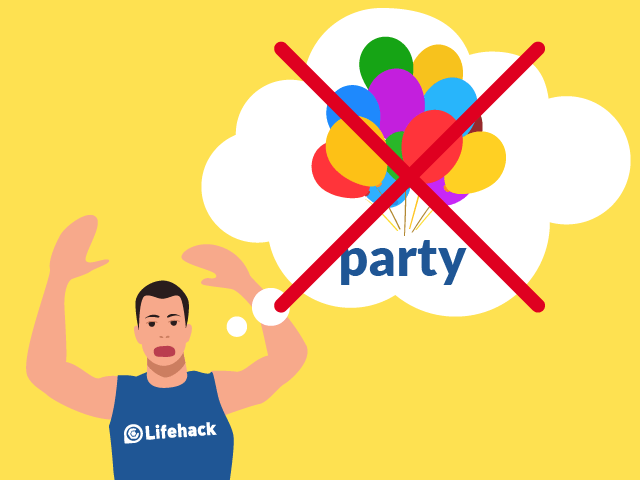There’s an avalanche of information about introverts on the web. The great thing about it is that it helps a lot of people realize their own introverted tendencies. Many introverts are beginning to understand why situations commonly perceived as problems by many are, well, simply non-problems for them. Here are some of those positives only introverts would understand.
1. They love cancelled parties.
Introverts love cancelled parties. Okay, maybe love is too strong a word. But an introvert really wouldn’t mind if a big party he was invited to suddenly got cancelled or postponed.
Partying with a big group of people for a long period of time zaps an introvert’s energy. To expend less energy, introverts enjoy one-on-one conversations instead of group activities. You may know someone who’s dubbed as a “kill joy” because he wants to leave a party early. Stop the name-calling and consider that maybe that person is just tired and needs to recharge by spending some time by himself. He could be an introvert.
2. They’re cool with shutting up.
Society has a funny perception of silence. It’s as if something is terribly wrong if someone just wants to sit quietly by himself.
Remember that there is such a thing as companionable silence. It’s when two people are so relaxed and comfortable with each other that no words need to be spoken. And there’s solitude too, which is the creative’s refuge.
Introverts like silence and solitude because it’s during quiet times that many people, not just introverts, produce billion-dollar ideas, relax their minds, and recharge their bodies to face another day.
3. They get high (with energy) on being alone.
No invites on a Friday night? No problem!
While most people would be horrified and perhaps acutely depressed at the thought of spending the weekend minus social activities, your typical introvert is already getting started on his reading or movie list. That, or he’s already out hiking, hanging out at a bookshop, gardening, or writing weird poetry at the cafe.
But remember that being alone doesn’t equate to loneliness. The thing is, introverts need “alone time” for them to conserve their energy. This doesn’t mean that they’re alone all the time. Balance is key as Marti Olsen Laney explains in her book, The Introvert Advantage: How to Thrive in an Extrovert World, “Introverts need to balance their alone time with outside time, or they can lose other perspectives and connections.”
4. They’re comfortable with eating alone.
Dining alone has such a bad reputation, doesn’t it? Heaven forbid you eat a meal without a living human body next to you!
For most introverts, solo dining is a relaxing experience and a good opportunity to truly enjoy a meal in peace. Bear in mind that introverts have a low threshold for stimulation and are easily distracted. It’s a good thing people are starting to realize the value of dining in peace, like this restaurant.
5. They just like to watch.
As funny as that may sound, they do.
Introverts are observant by nature. They’re the quiet ones who prefer to sit at the sidelines and observe those around them. And no, they’re not judging people when they do this. This also doesn’t mean that introverts are wallflowers. They can talk your ear off if the topic is something they’re passionate or know a lot about. They simply don’t feel the need nor have the energy to be social butterflies.
As Susan Cain puts it, “We’re not anti-social; we’re just differently social.”
6. They have few friends.
More than anyone else, introverts are masters at prioritizing quality over quantity, especially when it comes to friends. They form fewer but deeper relationships with people. Amazingly though, many introverts thrive in the online world. Perhaps because online communication and networking gives them more time to think and reflect about how to express their responses as compared to real-world conversations.
7. They take it slow.
Most of the time, taking things slow is seen as a weakness and the ability to “think on your feet” is favored over the ability to reflect. But introverts prefer to do things little by little and think carefully before making big decisions. The innate gifts of slowing down and tuning into their inner world and reflecting on experiences and situations allow them to better understand other people and empathize.
Introverts are good at unsettling extroverts without even trying. They can appear mysterious and don’t show much reaction or facial expression. So take the time to get to know someone and learn what makes them tick. Do this especially when your personality leans toward extroversion. Pretty soon these positives may hold true for you as well.
















































